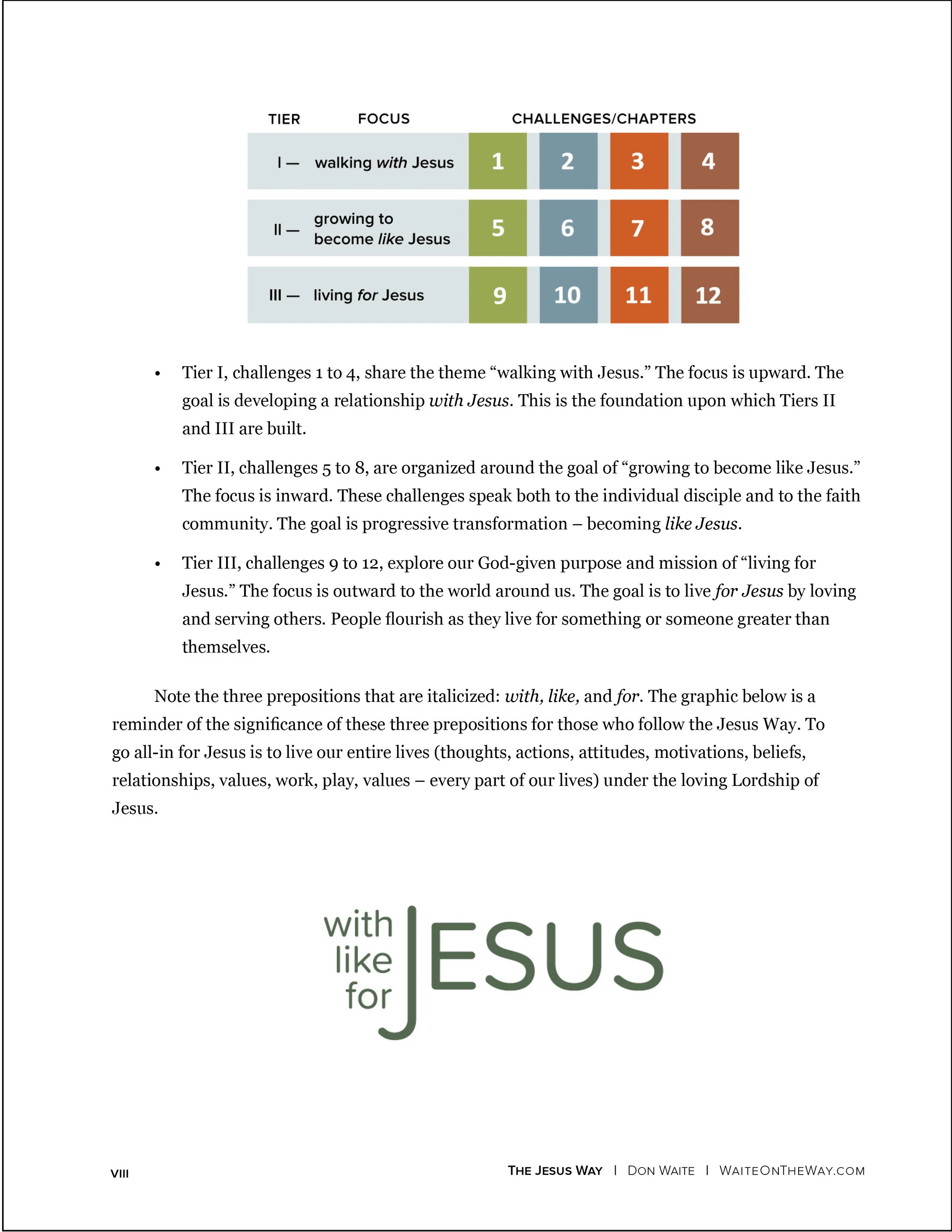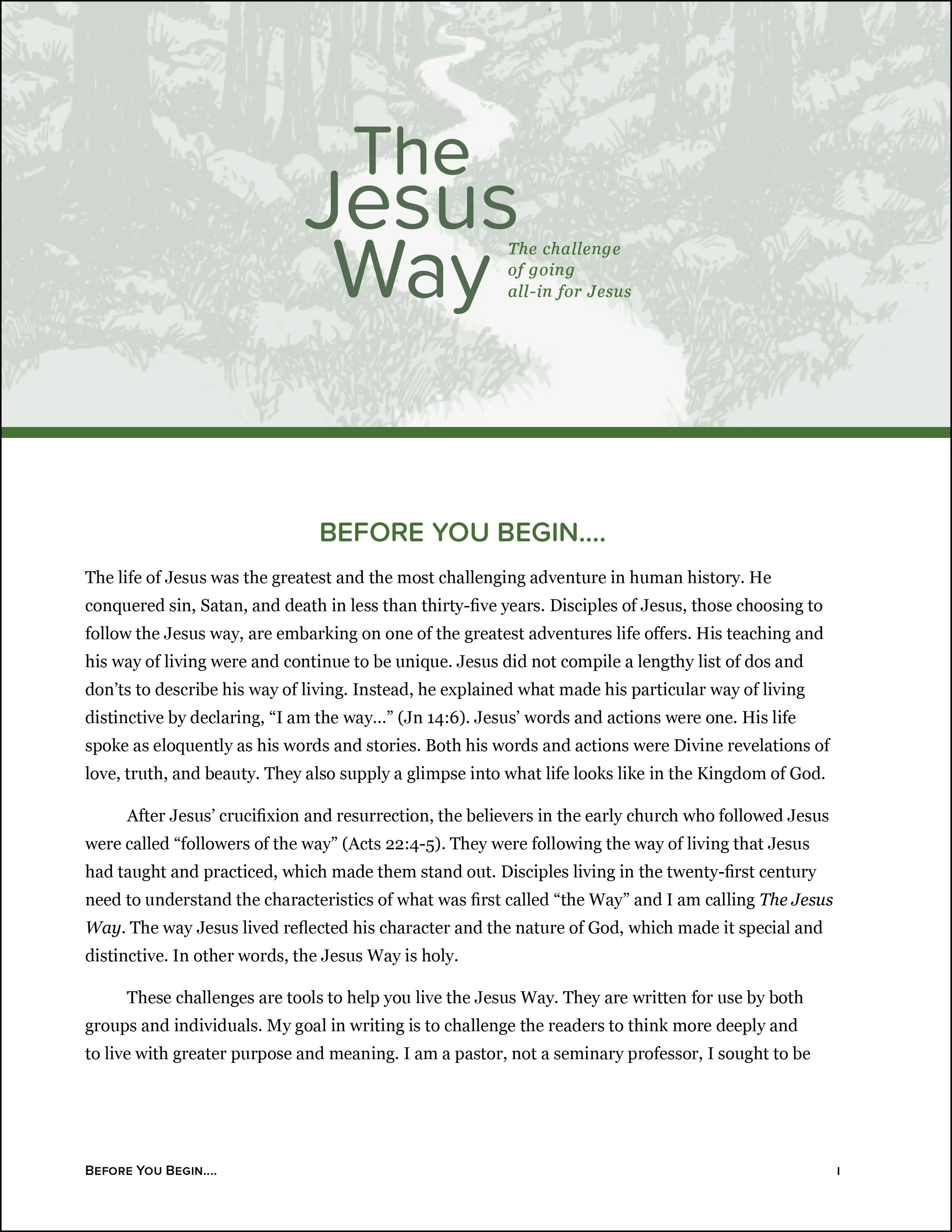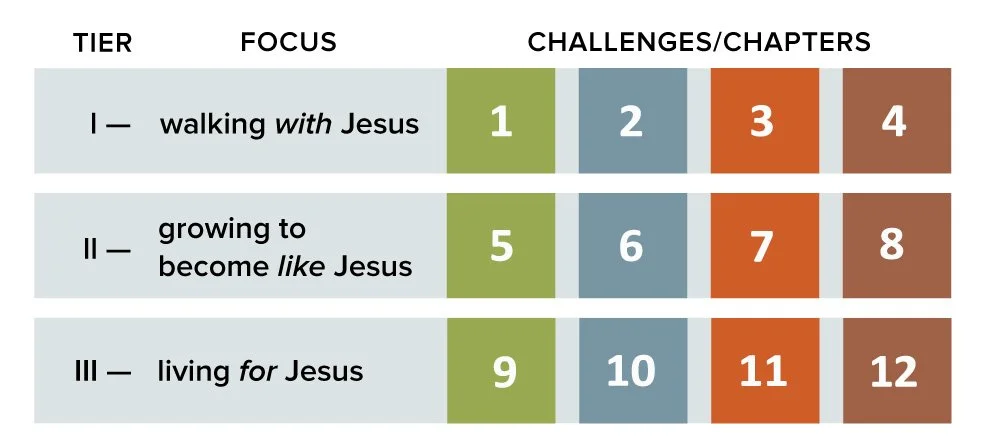Every journey benefits from a little preparation. Before You Begin is more than an introduction. This is your Chapter 1, before Challenge 1.
Read the online version of Before You Begin below.
Or download the book formatted 8.5” x 11” version. You can print this version to keep in a binder as you progress through the study.
Before You Begin
The life of Jesus was the greatest and the most challenging adventure in human history. He conquered sin, Satan, and death in less than thirty-five years.
Disciples of Jesus, those choosing to follow the Jesus way, are embarking on one of the greatest adventures life offers. His teaching and his way of living were and continue to be unique. Jesus did not compile a lengthy list of dos and don’ts to describe his way of living. Instead, he explained what made his particular way of living distinctive by declaring, “I am the way…” (Jn 14:6).
Jesus’ words and actions were one. His life spoke as eloquently as his words and stories. Both his words and actions were Divine revelations of love, truth, and beauty. They also supply a glimpse into what life looks like in the Kingdom of God.
After Jesus’ crucifixion and resurrection, the believers in the early church who followed Jesus were called “followers of the way” (Acts 22:4-5). They were following the way of living that Jesus had taught and practiced, which made them stand out. Disciples living in the twenty-first century need to understand the characteristics of what was first called “the Way” and I am calling The Jesus Way. The way Jesus lived reflected his character and the nature of God, which made it special and distinctive. In other words, the Jesus Way is holy.
These challenges are tools to help you live the Jesus Way. They are written for use by both groups and individuals. My goal in writing is to challenge the readers to think more deeply and to live with greater purpose and meaning. I am a pastor, not a seminary professor. I sought to be orthodox but not ordinary and truthful but not preachy. I have been a disciple of Jesus for over fifty years and a pastor for over forty years. My passion and purpose in life is to obey the Great Commission by making disciples who embrace living according to the Jesus Way. He said, “go and make disciples….” I believe this is the church’s marching order and I pray that God will use this manuscript to facilitate that goal.
I intentionally use the word “disciple.” It is a biblical word that often appears in the gospels. The word “Christian” appears just three times in the entire Bible, but “disciple” is used nearly three hundred times. “Christian” and “disciple” are synonyms, words with similar meaning. Unfortunately, “Christian” has lost much of its original significance of being associated with Jesus and his way of living. In recent years, the term “Christian” is increasingly used as a pejorative term describing anyone who is bigoted, hateful, close-minded, or an oppressor of minorities—qualities that should never be associated with the Jesus Way of living.
Disciple, on the other hand, carries no significant baggage. It was a common term in first-century Palestine. Everyone understood it referred to one who followed a particular rabbi (teacher), as a student or intern. Dallas Willard defined a disciple as “an apprentice of Jesus in Kingdom living” (The Great Omission, p. 166). Disciples of Jesus are “apprentices” of Jesus, learning how to live under God’s loving rule. Sometimes “student” is used as a synonym for disciple. However, I associate student with the learning that takes place in a classroom. But an apprentice receives on-the-job training, and learns by living under the tutelage of an expert (a journeyman). Apprentices learn practical skills in the classroom of daily life. Jesus is our expert and guide as well as our leader and Lord. He leads while apprentices follow his example and obey his teaching. The order is critically important. Jesus leads and disciples follow.
Willard’s definition also clarifies that disciples of Jesus are learning how to live in the Kingdom of God. He calls it “Kingdom living.” Disciples have dual citizenship. We are citizens of a specific country, but also citizens of God’s heavenly Kingdom. Our training as apprentices prepares us to live as faithful citizens in God’s eternal Kingdom. The Jesus Way is learning to live here and now like we will live there and then—when Jesus returns and consummates his Kingdom. Our apprenticeship under the guidance and teaching of Jesus requires a lifetime to complete.
The Jesus Way Is Difficult
G. K. Chesterton once said,
“Christianity has not been tried and found wanting; it has been found difficult and not tried.”
Naturally, we try to make it easier, less demanding, and more socially acceptable. Various church leaders have sought to turn Christianity into a promise of wealth and comfort, free from pain and suffering. Other teachers have twisted it into a therapeutic search for self-discovery. Some activists have made the Christian faith subservient to a political ideology in a quest for power. There is always social pressure to conform our faith to the current cultural values and trends. Consequently, the Apostle Paul wrote, “Don’t copy the behavior and customs of this world” (Rom 12:2). We must nourish and protect our faith to prevent it from being taken captive by our culture.
Furthermore, humans are prone to make idols, even “Christian” idols (Eph 5:5). We must guard against the tendency to manipulate the biblical revelation of God into an idol that reflects our personal agenda. Unfortunately, the faith practiced by some religious people who identify themselves as Christians would be unrecognizable to Jesus and his original disciples. For disciples, it’s always about following the Jesus Way, not getting our own way.
Living according to the Jesus Way, as Chesterton explained, is difficult. Jesus never sugar coated it or sought to make it easier. He flat out declared it was difficult!
Matthew 7:13-14
¹³ “You can enter God’s Kingdom only through the narrow gate. The highway to hell is broad, and its gate is wide for the many who choose that way. ¹⁴ But the gateway to life is very narrow and the road is difficult [the Jesus Way], and only a few ever find it.
Jesus blazed the trail for us to follow. Disciples do not follow the crowd through the wide gate to the road beaten into a smooth surface by the countless people who choose that route. Like an interstate highway, this road has wide bridges, guardrails, and frequent rest areas. The Jesus Way, on the other hand, has a narrow gate which is easy to miss, and the road is steep and unpaved, with many switchbacks. It resembles a hiking trail through the wilderness more than a modern highway.
Obviously, the Jesus Way is not something tangible you can touch or see. You cannot find it on any map. Even the best GPS cannot direct us to that narrow gate. Only Jesus knows the way because he is the Way (Jn 14:6), the Way is the route to our destination, life as God intended it to be lived as residents and citizens in the Kingdom of God. There is no route to his Kingdom that does not go through Jesus. The Republican Party does not know the route and neither does the Democratic Party. Politicians cannot guide you there. No plane or rocket can fly you there. Only Jesus knows the way to the Kingdom because he is the King. You only find the way by intentionally and faithfully following Jesus as his apprentice in Kingdom living.
Jesus is both the way to enter God’s Kingdom and the embodiment of what life in the Kingdom looks like. Jesus often taught about the Kingdom, telling his disciples to “Seek first the Kingdom of God” (Matt 6:33). He taught them to pray, “May your Kingdom come soon. May your will be done on earth, as it is in heaven” (Matt 6:10). Jesus both taught and exemplified Kingdom living.
Since Jesus is the way to enter the Kingdom and also the visible expression of what life is like in the Kingdom, the Jesus Way is a life-long journey toward the Kingdom. It’s serious business, but also resembles the games children play. Children often pretend they are doctors, teachers, or firefighters. In doing so, they are unintentionally preparing to become what they have played at, a grownup. Perhaps that is a partial explanation of why Jesus said we need to become like children to enter the Kingdom of God (Matt 18:3, 19:14).
Life Is a Journey
The Bible often uses terms like path or road to describe life. “Teach me how to live, O LORD. Lead me along the right path” (Psalm 27:11). This verse connects the good life, Kingdom living, with walking on the right path. It implies that life is a journey. There are dozens if not hundreds of other OT passages that echo that description of life. The NT reinforces that view. “We walk by faith not by sight” (2 Cor 5:7, NASB). Our life is a journey of faith. The author of Hebrews intensifies the walk into a run: “And let us run … the race God has set before us” (Heb 12:1). In this passage, life becomes a race that we run. The NIV translation describes it as “the race marked out for us”. God has marked out the route for our life journeys. And finally, Jesus added, “I am the Way” (Jn 14:6). He’s the ultimate “journey-man” that marks out the route of the race we run. The way is marked by Jesus’ actions and words. Jesus both knows the way and is the way.
Redemptive history began with a journey. God called Abram to “go to the land I will show you” (Gen 12:1). That journey lasted the rest of his life. Moreover, the biblical paradigm for salvation is found in the next book of the Bible. Exodus is the story of God liberating (saving) his people, the descendants of Abraham, who had become slaves in Egypt. It begins with the Passover when God saved the first-born sons of the Hebrews. Then God parted the waters of the Red Sea and the Hebrews walked between the walls of water on dry ground. They camped at the base of Mt. Sinai, where they entered into a covenant with God, received the Ten Commandments, built the tabernacle, and daily ate manna. God lived in the tabernacle and showed his presence through a pillar of fire in the darkness of night and a pillar of cloud in the hours of daylight. When the cloud moved, the people followed. God led them to the border of the promised land, where fear overcame their faith. Because they refused to follow God into the land, God led them on a forty-year detour through the Sinai Desert during which the older generation died. The exodus ends with the next generation camped on the banks of the Jordan River, preparing to follow God into the Promised Land near Jericho. The Exodus journey is the original paradigm for salvation in the Bible. Israel’s salvation was a journey led by the Lord. He led, they followed.
The New Testament begins with a genealogy of Jesus followed by a journey. Jesus was born after Mary and Joseph had journeyed to Bethlehem. The Magi followed a star on a long journey to see the newborn king. The shepherds made a short journey to see the baby Jesus. Then an angel warned Joseph of King Herod’s plot to kill the baby, so he took Mary and Jesus and fled to Egypt. When they heard Herod had died, they returned to Nazareth. After Jesus’ baptism and 40 days fasting in the wilderness, he began his public ministry, a peripatetic (walking) ministry. Jesus never stayed in one place for an extended time. He typically walked from village to village with his disciples. The gospels give the impression that Jesus’ ministry could be described as an almost continuous journey.
After his crucifixion and resurrection Jesus told his disciples, “As the Father has sent me, so I am sending you” (Jn 20:21). Church history confirms that after Pentecost when they were filled with the Spirit, those twelve disciples who had been appointed as apostles, journeyed to Africa, Europe, and Asia (as far as India) living as Jesus had lived and teaching as Jesus had taught them. They had been sent by Jesus, and like Jesus, most of them had peripatetic ministries. The Apostle Paul’s three missionary journeys read like adventure stories but are historical accounts of the growth of the first century Church.
Often it’s on journeys or pilgrimages that people meet God up close and personal. That pattern describes the experience of the original disciples. As they followed Jesus on the dusty roads and trails of ancient Palestine, they came to understand Jesus’ identity and mission. Jesus also taught them by sending them out in pairs, without money or belongings, to teach and heal. They experienced on-the-job training under the world’s greatest “Journey-man.”
All Journeys Are Not Equal
However, all journeys are not equal. People choose to follow different routes which lead to different destinations. Disciples are those who chose the Jesus Way. After finding that narrow gate, our greatest challenge is to stay on the path leading to the Kingdom. There are countless distractions and temptations that cause us to stumble or to lose our way. We stay on the path as long as we keep the correct order: Jesus leads, and we follow. This is the Jesus Way. As we follow him, we practice Kingdom living in anticipation of living under the loving and gracious rule of Jesus forever.
The Jesus Way is unique and different from all other spiritual journeys. The early Christians were called “followers of the Way” because that’s what disciples did. They followed Jesus who alone is “the way, the truth, and the life” (Jn 14:6). The Jesus Way touches every part of life, not just the religious sphere. The journey was and continues to be a life-changing and life-enhancing experience because the Kingdom of God is about abundant life – the fullest expression of life possible.
Living the Jesus Way
“God always takes the initiative; disciples respond in faith.” This simple principle needs to be understood, remembered, and shared. It means God is in charge, not us. God is the Creator; we are his created beings. God speaks; we listen. God commands; we obey. God leads; we follow. God gives; we receive. God reveals truth; we believe the truth. God saves; we are rescued. God loves; we flourish. Understanding this is simple, but living it fosters genuine gratitude and humility in us. It also guards us from twisting the gospel into a legalistic religious system based on merit. Consequently, every challenge on the Jesus Way is a “response” to what God has done or promises to do.
There is also a natural flow to Jesus’ way of living explored in this study. Our starting point is always going “all-in” for Jesus, but God’s love, mercy, and grace always precede our response. We may or may not have recognized God’s vital role in our lives prior to our decision to go “all-in” for Jesus, but our response is an expression of faith and the foundation for all the challenges that follow.
When Jesus was asked which of the six hundred and thirteen OT commandments was most important, he quoted the commandments to love God with all of our being and to love our neighbor as ourselves. Then he explained that the rest of the commandments were commentary that revealed the implications of the two key commandments he had highlighted. Likewise, in this document, the first challenge (chapter), “All-In,” is foundational for everything that follows. Going all-in is the most challenging response he asks us to make. In a sense, going all-in incorporates everything that follows in this study. The last eleven chapters clarify the details of what “All-In” means in the first chapter. Thus, as we work out the twelve challenges, we are working out the deeper implications of what it means to go all-in for Jesus.
There is a natural progression to the twelve challenges. They are closely related and interdependent. Once you have begun to grasp the meaning and flow of the challenges, you will increasingly recognize recurring biblical themes that underlie and unify The Jesus Way. After you have worked through the first four challenges that comprise the first tier, you are prepared to mentor others who are just beginning “The Jesus Way.” Helping others navigate the challenges will multiply your joy. Following Jesus was a communal experience for the original twelve and so it should be for you. The more the merrier.
The twelve challenges of The Jesus Way are organized into three stages or “tiers” pioneered by St. Ignatius, the founder of the Society of Jesus, commonly known as the Jesuits. I encourage you to think of the “tiers” as being building blocks. “Tier I” lays the foundation for all that follows. My life has been enriched immeasurably by working through the Spiritual Exercises of St. Ignatius. This document is comprised of three tiers that I borrowed from Ignatius.
Tier I, Challenges 1 to 4, share the theme “walking with Jesus.” The focus is upward. The goal is developing a relationship with Jesus. This is the foundation upon which Tiers II and III are built.
Tier II, Challenges 5 to 8, are organized around the goal of “growing to become like Jesus.” The focus is inward. These challenges speak both to the individual disciple and to the faith community. The goal is progressive transformation – becoming like Jesus.
Tier III, Challenges 9 to 12, explore our God-given purpose and mission of “living for Jesus.” The focus is outward to the world around us. The goal is to live for Jesus by loving and serving others. People flourish as they live for something or someone greater than themselves.
Note the three prepositions that are italicized: with, like, and for. To go all-in for Jesus is to live our entire lives (thoughts, actions, attitudes, motivations, beliefs, relationships, values, work, play – every part of our lives) under the loving Lordship of Jesus.
Practical Considerations
The Jesus Way does not address the sacraments (ordinances). In my tradition, we celebrate two sacraments: baptism and the Lord’s Supper. However, I intentionally have not included them in these pages. There are different perspectives on these topics within the wider Christian family. So, I defer to your spiritual leaders to articulate the approach embraced by your particular branch of the family. I suggest that baptism be addressed at some time when working through the first challenge, “All-In.” The Lord’s Supper may be best covered in Challenge 6, “Better Together.”
Only a disciple can make a disciple. And when a disciple personally, intentionally, and steadfastly seeks to help another person to follow Jesus (make a disciple), they are assuming the role of a mentor. In the context of The Jesus Way, mentors are fellow apprentices who have more experience in following Jesus, and deliberately invest themselves in building other disciples. They make themselves available as needed or may meet regularly to share life and faith together. I am privileged to have been mentored by many different disciples at various stages of my continuing spiritual journey. Each mentor has enriched my life and increased my joy. Consequently, I have naturally invested myself in building other apprentices by mentoring them. It is one of the most meaningful and enjoyable privileges I have experienced. I feel like I have gained so much more than those I’ve mentored.
All of us need help in our personal journeys of faith. Everyone’s journey is unique and yet every journey holds similar components. God does not expect or desire any of us to figure this all out by ourselves, to make ourselves like Jesus through self-effort. He has given us his Holy Spirit to guide and empower us, but he has also given us one another to support, encourage, advise, and hold one other accountable. We can never be fully ourselves by ourselves. We thrive in community. Mentors are part of God’s process. The sooner this happens in the disciple making process the better it is for both the mentor and the one being mentored. Usually, men mentor men and women mentor women. You may ask someone to serve as your mentor as you begin this study, or partner with a friend and co-mentor with one another.
Colossians 3:16
Teach and counsel each other with all the wisdom he gives.
All Scripture quotes are from the New Living Translation (NLT) unless otherwise noted. I have found this particular version easy to understand, especially for people who are not familiar with the Bible. But you are encouraged to use whatever translation you prefer.
If you are reading and following The Jesus Way in a small group or a class, personal and confidential information will inevitably be shared. If you learn personal information that is not available to the public, that information must be treated as confidential. Otherwise, it becomes gossip. A commitment to keep confidential information confidential is necessary. This is one way we show love and respect for each other. Members of the group are only able to share honestly when they feel safe, knowing their confidential information will remain private.
Finally, there is a theological conviction of mine which undergirds all of The Jesus Way that may not be obvious. The mystery of the Trinity is at the very essence of my understanding of God. Yet The Jesus Way consistently focuses on Jesus. This is intentional. Jesus is the gateway into understanding our Triune God. Perhaps we could think of Jesus as the face of God. Seeing him is to see God. To hear his words is to hear God’s words. Yet Jesus also was and is fully human. God came to us as a human being, and he made this claim:
Luke 10:22
My Father has entrusted everything to me. No one truly knows the Son except the Father, and no one truly knows the Father except the Son and those to whom the Son chooses to reveal him.
Jesus exercises Divine authority because he is Divine. He also spoke about the profound intimacy he experiences with the Father. He declared that he alone reveals the Father to us. Jesus was emphatic when he told Philip, “Anyone who has seen me has seen the Father!” (Jn 14:9). This mystery is far beyond my ability to explain or even describe, yet I believe it because Jesus taught it to his disciples.
Jesus is the fullest revelation of God. To know Jesus is to know the Father and to know the Spirit. When Jesus’ original group of disciples, the twelve, initially met Jesus, they did not understand they had also met the Father. And the same Spirit that led and empowered Jesus, also led and empowered his disciples. Yet they were disciples of Jesus, just as we are called to be disciples of Jesus. Consequently, we focus on Jesus in The Jesus Way, but in doing so we also meet both the Father and the Spirit, the fullness of the Godhead. For to love and obey Jesus is to love and obey God. This was the Father’s plan. Welcome to the grand adventure of following Jesus.
In the Great Commission (Matt 28:18-20), Jesus charged his followers “to make disciples” and to “teach these new disciples to obey all the commands I have given you.” Then Jesus promised, “Be sure of this: I am with you always even to the end of the age.” This work is my attempt to obey the Lord by articulating what I understand to be the core components of Jesus’ teaching, what we must teach those who seek to follow Jesus. All disciples need to understand and embrace the twelve challenges if they are to flourish. In the context of the Great Commission, the promise, “I am with you always” is tied to our obedience to the Great Co-mission. Jesus was inviting us to make his mission our personal mission. When we do this by making disciples, Jesus keeps his promise to be with us to the end of the age.





